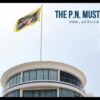The weeks of long knives at the PN HQ have just been put in temporary suspension as an apparent reprieve has been found. ‘Party stalwart’ Louis Galea described as the man who transformed the PN into a ‘slick political machine’ between 1977 and 1987 has been appointed as AZAD Head and given the mission to […]

